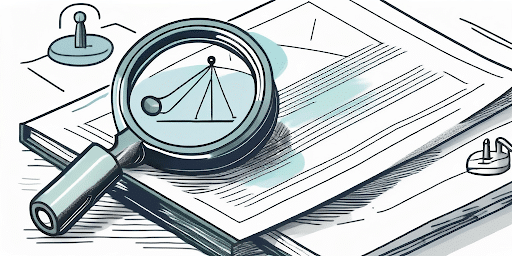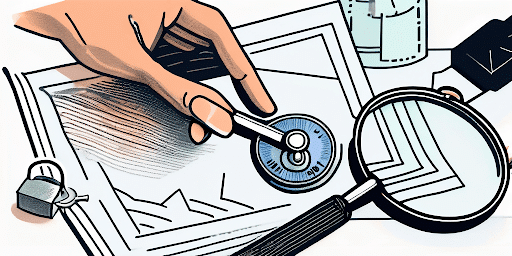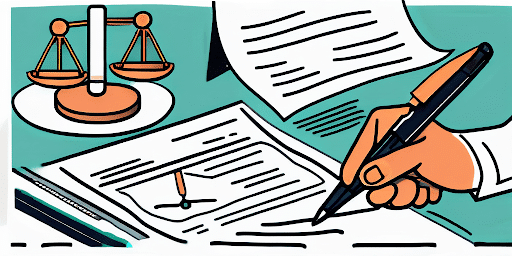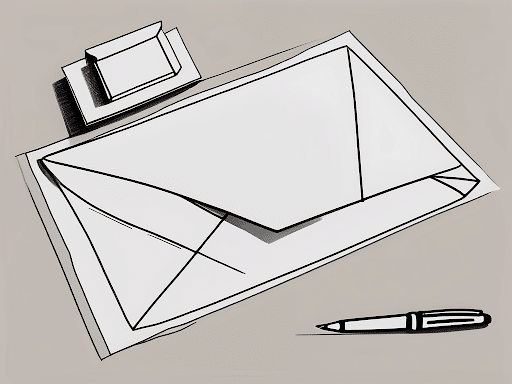Before signing a non-disclosure agreement (NDA), it is essential to have a clear understanding of its purpose, contents, and potential implications. An NDA is a legal contract between two or more parties that aims to protect confidential information shared during a business or professional relationship. Whether you are an entrepreneur, an employee, or a freelancer, here are five crucial factors to consider before putting pen to paper.
Understanding the Basics of a Non-Disclosure Agreement
Definition of a Non-Disclosure Agreement
A non-disclosure agreement, also known as a confidentiality agreement, is a legally binding contract that establishes the terms under which confidential information is shared. It ensures that the recipient of the information agrees not to disclose or use it without the consent of the disclosing party.

Non-disclosure agreements can cover a wide range of information, including business strategies, financial data, product designs, and customer lists. These agreements are crucial in various industries, such as technology, healthcare, and finance, where protecting sensitive information is paramount.
Importance of an NDA in Business
Non-disclosure agreements play a vital role in protecting sensitive business information, trade secrets, customer data, and proprietary knowledge. By signing an NDA, parties can collaborate with confidence, knowing that their valuable information remains secure and confidential.
Businesses often use NDAs when engaging in partnerships, mergers and acquisitions, hiring employees, or working with contractors. These agreements help prevent the unauthorized disclosure of information that could harm a company’s competitive advantage or reputation.
Key Elements of a Non-Disclosure Agreement
Parties Involved in an NDA
An NDA typically involves two parties: the disclosing party, who shares the confidential information, and the receiving party, who receives and agrees to protect it. It is essential to clearly identify all parties involved and their respective roles to avoid any confusion or potential disputes in the future.
Additionally, when drafting an NDA, it is important to consider the relationship between the parties. For example, if the disclosing party is a business entity, the NDA may need to specify which employees or representatives are authorized to disclose confidential information on behalf of the company. This level of detail helps to ensure that only designated individuals are sharing sensitive data.
Confidential Information Definition
One of the critical elements of an NDA is the definition of confidential information. It should clearly outline what type of information is considered confidential and subject to protection, ensuring that both parties are aware of the extent of their obligations.
Furthermore, the NDA should address how confidential information will be marked or identified to distinguish it from non-confidential information. Establishing clear guidelines on how to label sensitive data can help prevent accidental disclosures and strengthen the overall protection of proprietary information.
Obligations and Restrictions
The obligations and restrictions outlined in an NDA specify how the receiving party should handle confidential information. This includes provisions on non-disclosure, non-use, and limitations on sharing the information with others. It is crucial to carefully review and understand these obligations before committing to them.
In addition to standard obligations, such as maintaining confidentiality, some NDAs may include clauses related to data security measures that the receiving party must implement to safeguard the information. These measures could include encryption protocols, restricted access controls, and regular security audits to ensure compliance with industry standards and best practices.
Potential Risks and Consequences of an NDA
Legal Implications of Breaching an NDA
Breaching an NDA can have severe legal consequences. The injured party may seek damages, injunctive relief, or even request a court order to prevent further disclosure or use of the confidential information. Understanding the potential risks involved can help you make an informed decision before signing the agreement.

Furthermore, breaching an NDA can not only result in financial penalties but also damage your reputation in the industry. Violating trust and confidentiality can lead to strained relationships with business partners and potential future opportunities.
Financial Risks Associated with NDAs
There may be financial implications associated with NDAs. Some agreements include provisions for liquidated damages or stipulate the payment of attorney fees in the event of a breach. It is crucial to carefully assess and evaluate these provisions, keeping in mind the potential financial consequences.
In addition to direct financial penalties, breaching an NDA can also lead to indirect financial losses. For instance, if the confidential information that was disclosed is a trade secret or intellectual property, its value could be significantly diminished, impacting the overall worth of your business.
Seeking Legal Advice Before Signing an NDA
Non-Disclosure Agreements (NDAs) play a crucial role in protecting sensitive information and trade secrets. However, before signing an NDA, it is essential to understand the implications of such a legally binding document. Seeking legal advice is highly recommended to navigate the complexities of these agreements effectively.
An experienced lawyer specializing in contract law can provide invaluable assistance in reviewing an NDA. They have the experience to carefully examine the agreement, decipher its legal jargon, and ensure that your rights and interests are safeguarded. By engaging a lawyer, you can gain clarity on the terms outlined in the NDA and identify any potential risks or liabilities.
Role of a Lawyer in Reviewing NDAs
Lawyers play a pivotal role in the NDA review process by offering comprehensive insights into the legal ramifications of signing such a document. They can assess the scope of the confidentiality obligations, evaluate the potential consequences of breach, and advise you on the best course of action to protect your proprietary information.
Questions to Ask Your Lawyer
When consulting with a lawyer regarding an NDA, it is essential to come prepared with a list of pertinent questions. Inquire about the specific implications of each clause, seek clarification on any vague language, and request guidance on how to mitigate any unfavorable terms. Your lawyer can provide tailored advice based on your individual circumstances and help you navigate the negotiation process effectively.
Negotiating the Terms of an NDA
Understanding Your Rights
Remember that an NDA is a negotiable contract. Understanding your rights and the potential impact on your business or career is essential. Do not hesitate to propose amendments or suggest modifications to clauses that you believe are unreasonable or do not align with your objectives.

It’s important to recognize that Non-Disclosure Agreements (NDAs) play a crucial role in safeguarding sensitive information and intellectual property. By establishing clear guidelines for the protection of confidential data, NDAs help prevent unauthorized disclosure and maintain the competitive edge of businesses in today’s fast-paced market.
Tips for Negotiating an NDA
When negotiating an NDA, approach the process with a clear understanding of your goals and priorities. Identify key provisions that are crucial to your interests, but also be open to reasonable compromises. Effective negotiation can lead to a mutually satisfactory agreement that protects the interests of all parties involved.
Furthermore, it’s advisable to conduct a thorough review of the NDA to ensure that all terms are clearly defined and mutually beneficial. Consider seeking input from legal professionals to gain valuable insights and ensure that the agreement aligns with industry standards and best practices.
In conclusion, before signing a non-disclosure agreement, it is essential to educate yourself about its purpose, understand the key elements, and carefully assess the potential risks. Seeking legal advice, asking relevant questions, and negotiating favorable terms can help ensure that your confidential information is adequately protected. Remember, a well-crafted NDA can foster trust and facilitate successful collaborations, making it a valuable tool in today’s business landscape


